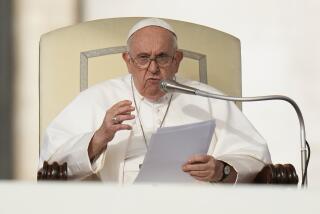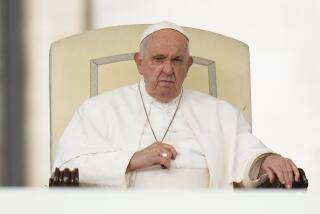Church Pressure on Polish Priest to Leave Told
- Share via
WARSAW — In the months before his murder, Father Jerzy Popieluszko came under pressure from Poland’s Communist authorities and the Polish Roman Catholic Church to leave the country for prolonged study in Rome, according to a Warsaw priest who knew Popieluszko well.
The priest said that both church and state had viewed this as a humane form of exile for the controversial Popieluszko.
The Warsaw priest said the Polish primate, Cardinal Jozef Glemp, was unhappy with Popieluszko’s outspoken criticism of the state and his passionate defense of the banned Solidarity independent labor union. He said Glemp viewed the popular young cleric as a divisive force in Poland and believed that he was complicating church-state relations.
Request for a Transfer
The priest, who asked not to be identified by name, said in an interview that Popieluszko confided before his death that Glemp had accused him of transgressing acceptable limits of religious activity and had asked him to prepare a formal request to be transferred to Rome for study--in effect, to exile.
“He wanted Father Jerzy to write the request himself to go abroad, so that if a delegation of workers protested, the primate could show it to them,” the source said.
He added that Popieluszko resisted but that out of loyalty to the primate, he probably would have eventually consented to leave Poland.
A spokesman for Poland’s Catholic episcopate categorically denied the allegations but said it was true that the government was pressuring the church to “transfer” Popieluszko before the 37-year old priest was kidnaped and murdered in October. Four secret police officers are now on trial for the crime and face possible death sentences.
“The primate had no intention of sending Father Jerzy away without his personal request, and Father Jerzy never made such a request,” said the episcopate spokesman, who asked not to be named.
He added that “it is true there was pressure on church authorities and the primate to transfer Father Jerzy, but the primate had no intention of giving in to pressure from the government.”
Unofficial Chaplain
At the time of his death, Popieluszko was widely regarded as the unofficial chaplain of Solidarity. As such, he helped strengthen the bond between the outlawed labor union and Poland’s intensely nationalistic Catholicism. This in turn helped sustain Solidarity’s broad popular appeal as the embodiment of a national struggle for democratic reforms.
A protege of Cardinal Stefan Wyszynski, the late Polish primate, Popieluszko also won the sympathy and support of Pope John Paul II, with whom he corresponded. Friends of Popieluszko maintain that the Pope’s support was enough to deter Cardinal Glemp from curbing his activities during the first half of 1984, but that by late last summer, the priest came under increasing pressure from the episcopate--reflecting greater pressure from the government--to cease his pro-Solidarity sermons and leave Poland.
Unconfirmed reports that Popieluszko would be sent abroad circulated in Warsaw last summer. Confirmation that the government was pressuring the church to send him to Rome has emerged from the trial of the four Interior Ministry officers charged with the murder.
Defendant’s Position
According to the government indictment, the most senior of the four officers, Col. Adam Pietruszka, claimed in pretrial testimony that he had arranged for Popieluszko to be sent to Rome for study and that he therefore had no motive for encouraging his subordinate officers to kidnap and murder the priest, as the government has charged.
“He rejects as absurd allegations that he participated in the crime,” according to the indictment, a copy of which was obtained by The Times.
The indictment says that Pietruszka, in denying his complicity, claims that “it was thanks to his active participation that Rev. Jerzy Popieluszko received a scholarship and was soon to leave the country for a lengthy period of time in Rome, which rendered his murder superfluous.”
Pietruszka’s statement implies a major ability on the part of the Polish secret police to manipulate the church leadership. The church spokesman said there is no basis for this claim, and he termed as nonsense the colonel’s boast about arranging a scholarship for Popieluszko.
Pietruszka was known to church officials as a senior officer of the security service’s Fourth Department--the branch of the secret police assigned to control the church--through his occasional visits to the episcopate offices to deliver complaints, the official said.
He said Pietruszka took no part in church-state talks and added that the officer “was a pure ubek “--Polish slang for spook.
The trial of the four officers resumed Wednesday in the northern city of Torun after a four-day recess, with testimony from a second officer who said he believed that they were carrying out plans approved by a high-ranking government official.
Under questioning, Lt. Waldemar Chmielewski, 29, said he was given to understand that a departmental director or deputy interior minister had authorized them to act against Popieluszko, even it meant the priest’s death.
His testimony corroborated statements in the first two days of the trial by Lt. Leszek Pekala, who said their superior and fellow defendant, Capt. Grzegorz Piotrowski, had invoked the name of a deputy interior minister in assuring the two junior officers that action to curb the priest had been approved at a high level. So far, the panel of seven judges has not pressed the two officers to name the official.
Chmielewski, the father of an 18-month-old child, spoke with a stutter, and the right side of his face trembled uncontrollably. A television news announcer, narrating a brief film clip, said the secret police officer had suffered a nervous collapse after his arrest.
‘Terrorizing Operation’
During the planning of what he called a “terrorizing operation” against the priest, Chmielewski said he asked what would happen if Popieluszko--who was known to be in frail health--died.
He said Capt. Piotrowski replied that he “would have to consult on the matter because he was not competent to decide on his own.”
“In my presence, he called the office of Col. Pietruszka,” who was not in, Chmielewski said. Several days later, he continued, Capt. Piotrowski told him there was “authorization to act” even in the event of the priest’s death. The delay in obtaining an answer, he quoted the captain as explaining, came because “he (Col. Pietruszka) had to get in touch with the top ranks.”
Asked in court what was meant by top ranks, Chmielewski replied, “By the top, I understood it to mean one of the directors or deputy ministers.”
The government has condemned the murder as an act of “political banditry” and a “provocation” against Premier Wojciech Jaruzelski’s regime. However, the state’s indictment said that investigators were unable to prove that the crime was inspired at a higher level of authority than Pietruszka. Neither he nor Capt. Piotrowski, the alleged leader of the murder team, has testified yet.
More to Read
Sign up for Essential California
The most important California stories and recommendations in your inbox every morning.
You may occasionally receive promotional content from the Los Angeles Times.












